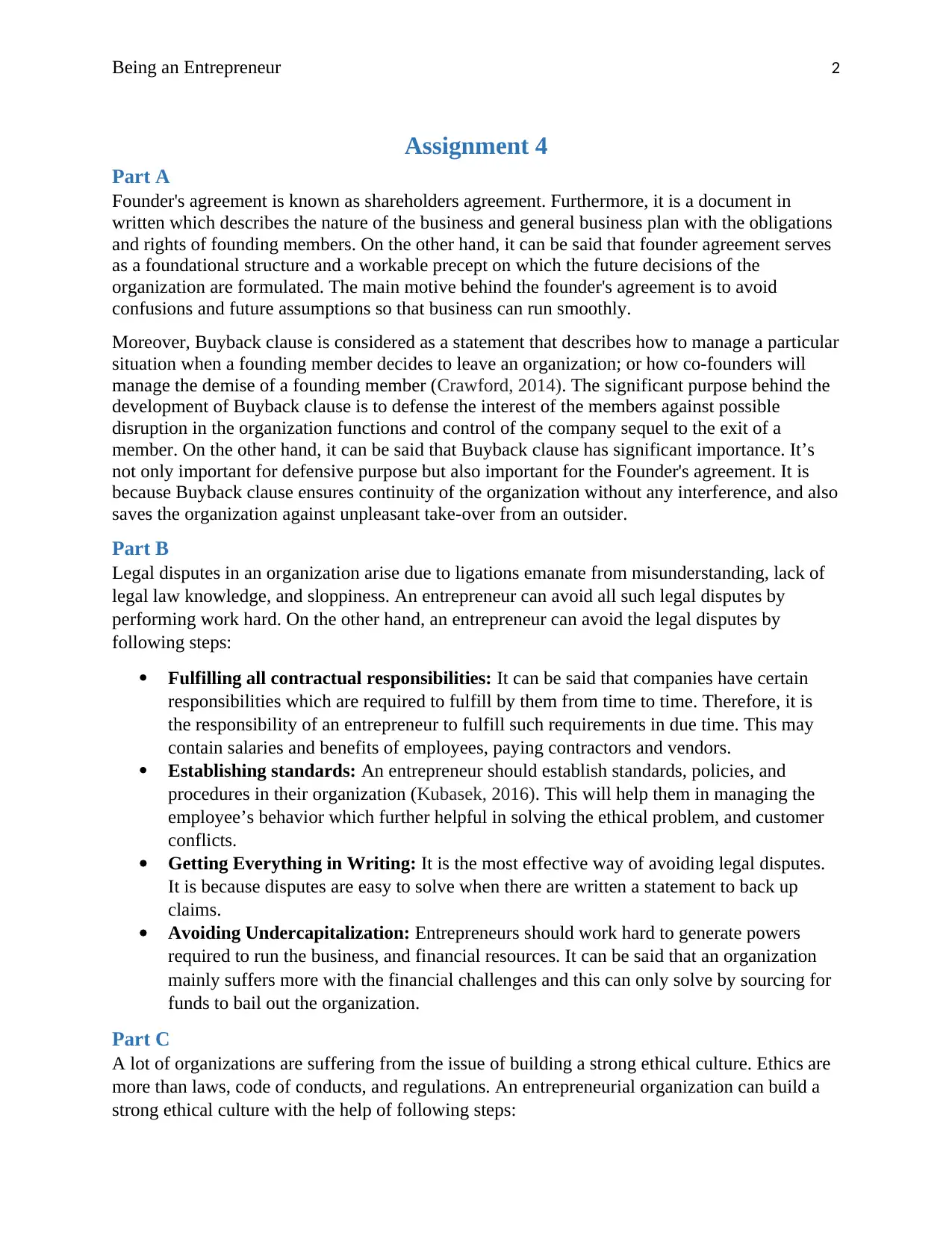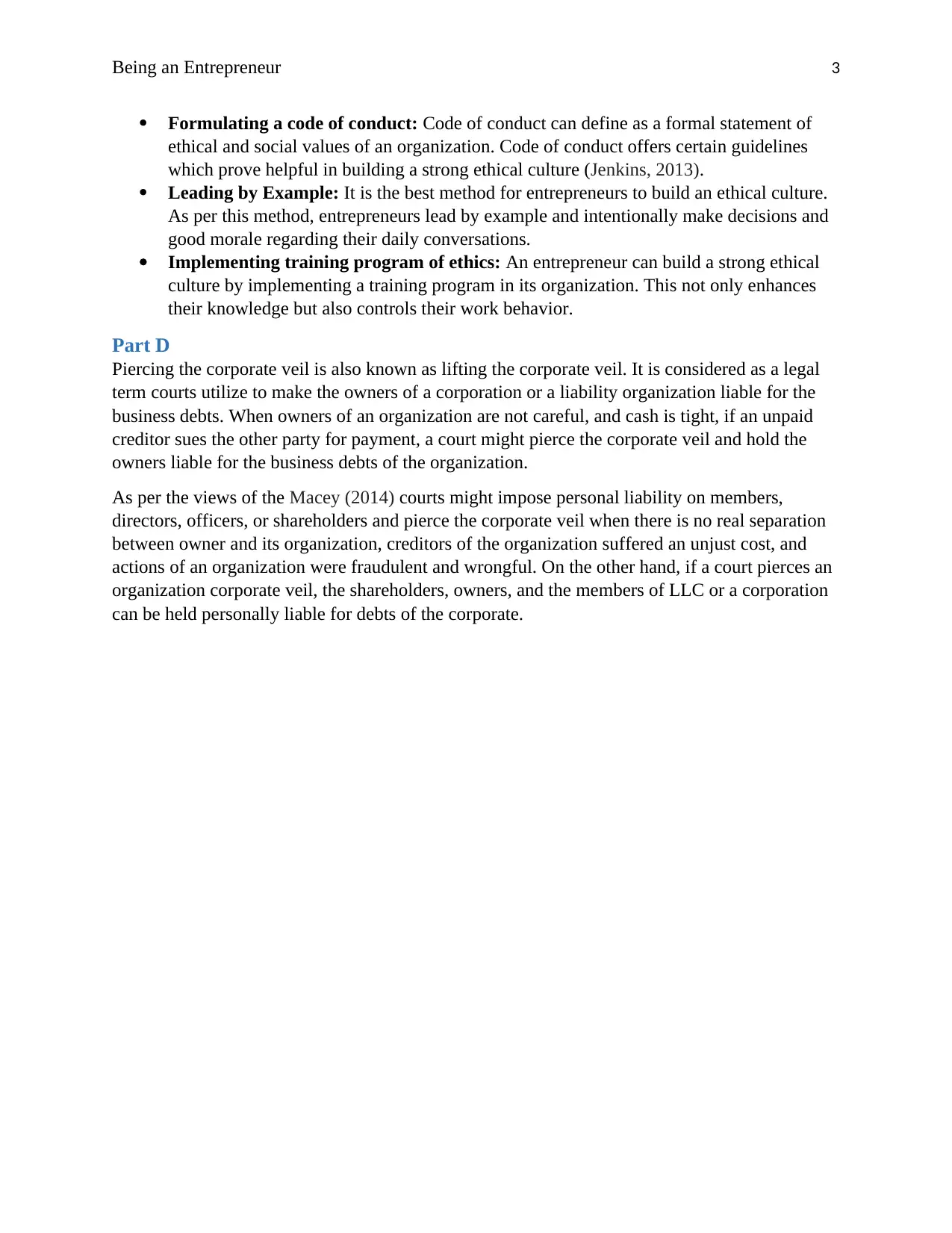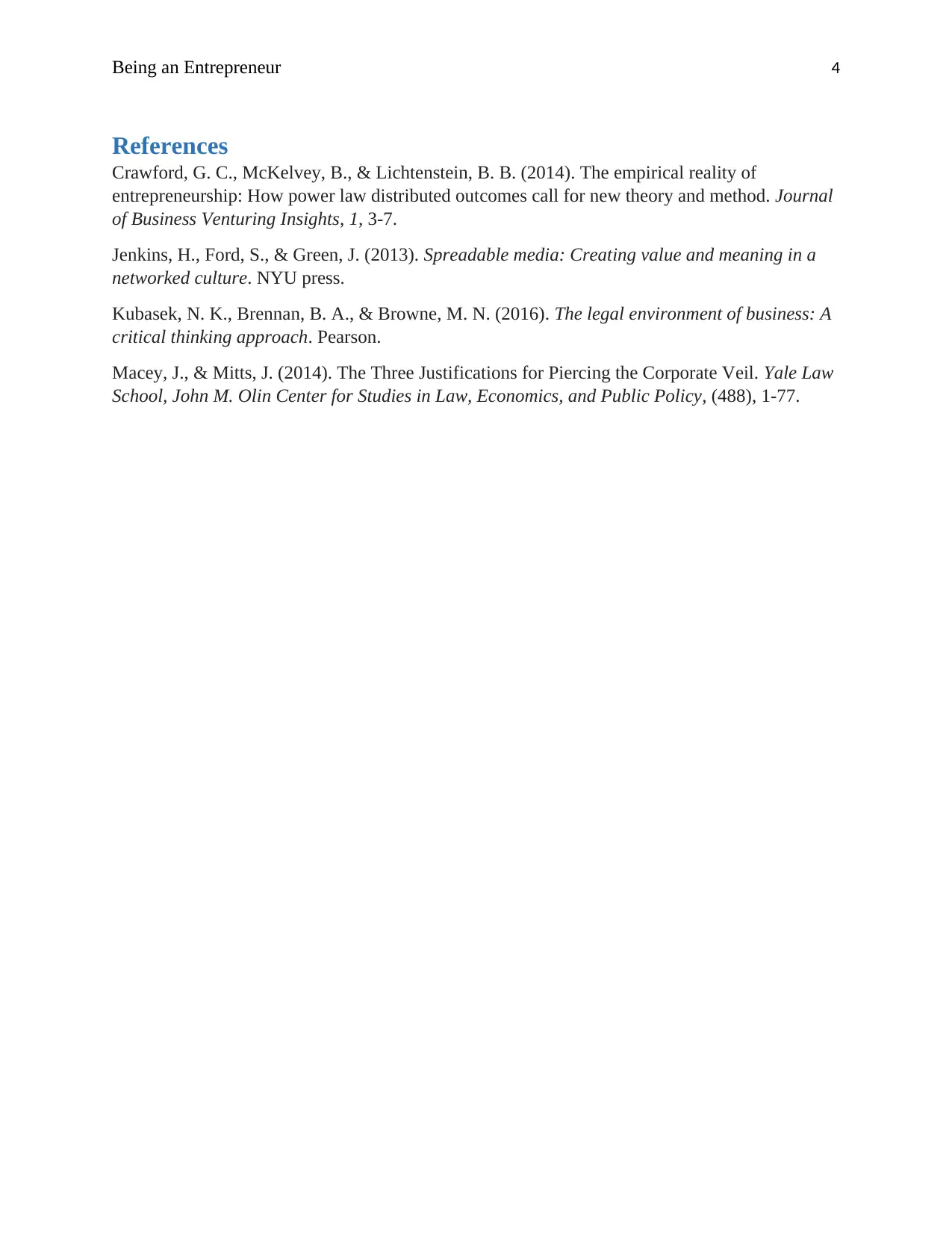Entrepreneurship Assignment: Legal and Ethical Considerations
VerifiedAdded on 2019/09/22
|5
|1024
|472
Homework Assignment
AI Summary
This entrepreneurship assignment solution covers several key aspects of starting and running a business. Part A focuses on founder's agreements, explaining their purpose and the importance of buyback clauses. Part B addresses legal disputes, providing steps entrepreneurs can take to avoid them, such as fulfilling contractual responsibilities and getting everything in writing. Part C delves into building a strong ethical culture within an organization, suggesting the formulation of a code of conduct and leading by example. Finally, Part D discusses piercing the corporate veil, a legal term where courts hold owners liable for business debts, outlining the conditions under which this can occur. The assignment draws on various academic sources to support its arguments, offering a comprehensive overview of legal and ethical considerations for entrepreneurs.

Running Head: Being an Entrepreneur
being an Entrepreneur
[Document subtitle]
being an Entrepreneur
[Document subtitle]
Paraphrase This Document
Need a fresh take? Get an instant paraphrase of this document with our AI Paraphraser

Being an Entrepreneur 1
Table of Contents
Assignment 4.................................................................................................................................................1
Part A.........................................................................................................................................................1
Part B.........................................................................................................................................................1
Part C.........................................................................................................................................................1
Part D.........................................................................................................................................................2
References......................................................................................................................................................5
Table of Contents
Assignment 4.................................................................................................................................................1
Part A.........................................................................................................................................................1
Part B.........................................................................................................................................................1
Part C.........................................................................................................................................................1
Part D.........................................................................................................................................................2
References......................................................................................................................................................5

Being an Entrepreneur 2
Assignment 4
Part A
Founder's agreement is known as shareholders agreement. Furthermore, it is a document in
written which describes the nature of the business and general business plan with the obligations
and rights of founding members. On the other hand, it can be said that founder agreement serves
as a foundational structure and a workable precept on which the future decisions of the
organization are formulated. The main motive behind the founder's agreement is to avoid
confusions and future assumptions so that business can run smoothly.
Moreover, Buyback clause is considered as a statement that describes how to manage a particular
situation when a founding member decides to leave an organization; or how co-founders will
manage the demise of a founding member (Crawford, 2014). The significant purpose behind the
development of Buyback clause is to defense the interest of the members against possible
disruption in the organization functions and control of the company sequel to the exit of a
member. On the other hand, it can be said that Buyback clause has significant importance. It’s
not only important for defensive purpose but also important for the Founder's agreement. It is
because Buyback clause ensures continuity of the organization without any interference, and also
saves the organization against unpleasant take-over from an outsider.
Part B
Legal disputes in an organization arise due to ligations emanate from misunderstanding, lack of
legal law knowledge, and sloppiness. An entrepreneur can avoid all such legal disputes by
performing work hard. On the other hand, an entrepreneur can avoid the legal disputes by
following steps:
Fulfilling all contractual responsibilities: It can be said that companies have certain
responsibilities which are required to fulfill by them from time to time. Therefore, it is
the responsibility of an entrepreneur to fulfill such requirements in due time. This may
contain salaries and benefits of employees, paying contractors and vendors.
Establishing standards: An entrepreneur should establish standards, policies, and
procedures in their organization (Kubasek, 2016). This will help them in managing the
employee’s behavior which further helpful in solving the ethical problem, and customer
conflicts.
Getting Everything in Writing: It is the most effective way of avoiding legal disputes.
It is because disputes are easy to solve when there are written a statement to back up
claims.
Avoiding Undercapitalization: Entrepreneurs should work hard to generate powers
required to run the business, and financial resources. It can be said that an organization
mainly suffers more with the financial challenges and this can only solve by sourcing for
funds to bail out the organization.
Part C
A lot of organizations are suffering from the issue of building a strong ethical culture. Ethics are
more than laws, code of conducts, and regulations. An entrepreneurial organization can build a
strong ethical culture with the help of following steps:
Assignment 4
Part A
Founder's agreement is known as shareholders agreement. Furthermore, it is a document in
written which describes the nature of the business and general business plan with the obligations
and rights of founding members. On the other hand, it can be said that founder agreement serves
as a foundational structure and a workable precept on which the future decisions of the
organization are formulated. The main motive behind the founder's agreement is to avoid
confusions and future assumptions so that business can run smoothly.
Moreover, Buyback clause is considered as a statement that describes how to manage a particular
situation when a founding member decides to leave an organization; or how co-founders will
manage the demise of a founding member (Crawford, 2014). The significant purpose behind the
development of Buyback clause is to defense the interest of the members against possible
disruption in the organization functions and control of the company sequel to the exit of a
member. On the other hand, it can be said that Buyback clause has significant importance. It’s
not only important for defensive purpose but also important for the Founder's agreement. It is
because Buyback clause ensures continuity of the organization without any interference, and also
saves the organization against unpleasant take-over from an outsider.
Part B
Legal disputes in an organization arise due to ligations emanate from misunderstanding, lack of
legal law knowledge, and sloppiness. An entrepreneur can avoid all such legal disputes by
performing work hard. On the other hand, an entrepreneur can avoid the legal disputes by
following steps:
Fulfilling all contractual responsibilities: It can be said that companies have certain
responsibilities which are required to fulfill by them from time to time. Therefore, it is
the responsibility of an entrepreneur to fulfill such requirements in due time. This may
contain salaries and benefits of employees, paying contractors and vendors.
Establishing standards: An entrepreneur should establish standards, policies, and
procedures in their organization (Kubasek, 2016). This will help them in managing the
employee’s behavior which further helpful in solving the ethical problem, and customer
conflicts.
Getting Everything in Writing: It is the most effective way of avoiding legal disputes.
It is because disputes are easy to solve when there are written a statement to back up
claims.
Avoiding Undercapitalization: Entrepreneurs should work hard to generate powers
required to run the business, and financial resources. It can be said that an organization
mainly suffers more with the financial challenges and this can only solve by sourcing for
funds to bail out the organization.
Part C
A lot of organizations are suffering from the issue of building a strong ethical culture. Ethics are
more than laws, code of conducts, and regulations. An entrepreneurial organization can build a
strong ethical culture with the help of following steps:
⊘ This is a preview!⊘
Do you want full access?
Subscribe today to unlock all pages.

Trusted by 1+ million students worldwide

Being an Entrepreneur 3
Formulating a code of conduct: Code of conduct can define as a formal statement of
ethical and social values of an organization. Code of conduct offers certain guidelines
which prove helpful in building a strong ethical culture (Jenkins, 2013).
Leading by Example: It is the best method for entrepreneurs to build an ethical culture.
As per this method, entrepreneurs lead by example and intentionally make decisions and
good morale regarding their daily conversations.
Implementing training program of ethics: An entrepreneur can build a strong ethical
culture by implementing a training program in its organization. This not only enhances
their knowledge but also controls their work behavior.
Part D
Piercing the corporate veil is also known as lifting the corporate veil. It is considered as a legal
term courts utilize to make the owners of a corporation or a liability organization liable for the
business debts. When owners of an organization are not careful, and cash is tight, if an unpaid
creditor sues the other party for payment, a court might pierce the corporate veil and hold the
owners liable for the business debts of the organization.
As per the views of the Macey (2014) courts might impose personal liability on members,
directors, officers, or shareholders and pierce the corporate veil when there is no real separation
between owner and its organization, creditors of the organization suffered an unjust cost, and
actions of an organization were fraudulent and wrongful. On the other hand, if a court pierces an
organization corporate veil, the shareholders, owners, and the members of LLC or a corporation
can be held personally liable for debts of the corporate.
Formulating a code of conduct: Code of conduct can define as a formal statement of
ethical and social values of an organization. Code of conduct offers certain guidelines
which prove helpful in building a strong ethical culture (Jenkins, 2013).
Leading by Example: It is the best method for entrepreneurs to build an ethical culture.
As per this method, entrepreneurs lead by example and intentionally make decisions and
good morale regarding their daily conversations.
Implementing training program of ethics: An entrepreneur can build a strong ethical
culture by implementing a training program in its organization. This not only enhances
their knowledge but also controls their work behavior.
Part D
Piercing the corporate veil is also known as lifting the corporate veil. It is considered as a legal
term courts utilize to make the owners of a corporation or a liability organization liable for the
business debts. When owners of an organization are not careful, and cash is tight, if an unpaid
creditor sues the other party for payment, a court might pierce the corporate veil and hold the
owners liable for the business debts of the organization.
As per the views of the Macey (2014) courts might impose personal liability on members,
directors, officers, or shareholders and pierce the corporate veil when there is no real separation
between owner and its organization, creditors of the organization suffered an unjust cost, and
actions of an organization were fraudulent and wrongful. On the other hand, if a court pierces an
organization corporate veil, the shareholders, owners, and the members of LLC or a corporation
can be held personally liable for debts of the corporate.
Paraphrase This Document
Need a fresh take? Get an instant paraphrase of this document with our AI Paraphraser

Being an Entrepreneur 4
References
Crawford, G. C., McKelvey, B., & Lichtenstein, B. B. (2014). The empirical reality of
entrepreneurship: How power law distributed outcomes call for new theory and method. Journal
of Business Venturing Insights, 1, 3-7.
Jenkins, H., Ford, S., & Green, J. (2013). Spreadable media: Creating value and meaning in a
networked culture. NYU press.
Kubasek, N. K., Brennan, B. A., & Browne, M. N. (2016). The legal environment of business: A
critical thinking approach. Pearson.
Macey, J., & Mitts, J. (2014). The Three Justifications for Piercing the Corporate Veil. Yale Law
School, John M. Olin Center for Studies in Law, Economics, and Public Policy, (488), 1-77.
References
Crawford, G. C., McKelvey, B., & Lichtenstein, B. B. (2014). The empirical reality of
entrepreneurship: How power law distributed outcomes call for new theory and method. Journal
of Business Venturing Insights, 1, 3-7.
Jenkins, H., Ford, S., & Green, J. (2013). Spreadable media: Creating value and meaning in a
networked culture. NYU press.
Kubasek, N. K., Brennan, B. A., & Browne, M. N. (2016). The legal environment of business: A
critical thinking approach. Pearson.
Macey, J., & Mitts, J. (2014). The Three Justifications for Piercing the Corporate Veil. Yale Law
School, John M. Olin Center for Studies in Law, Economics, and Public Policy, (488), 1-77.
1 out of 5
Your All-in-One AI-Powered Toolkit for Academic Success.
+13062052269
info@desklib.com
Available 24*7 on WhatsApp / Email
![[object Object]](/_next/static/media/star-bottom.7253800d.svg)
Unlock your academic potential
Copyright © 2020–2026 A2Z Services. All Rights Reserved. Developed and managed by ZUCOL.

